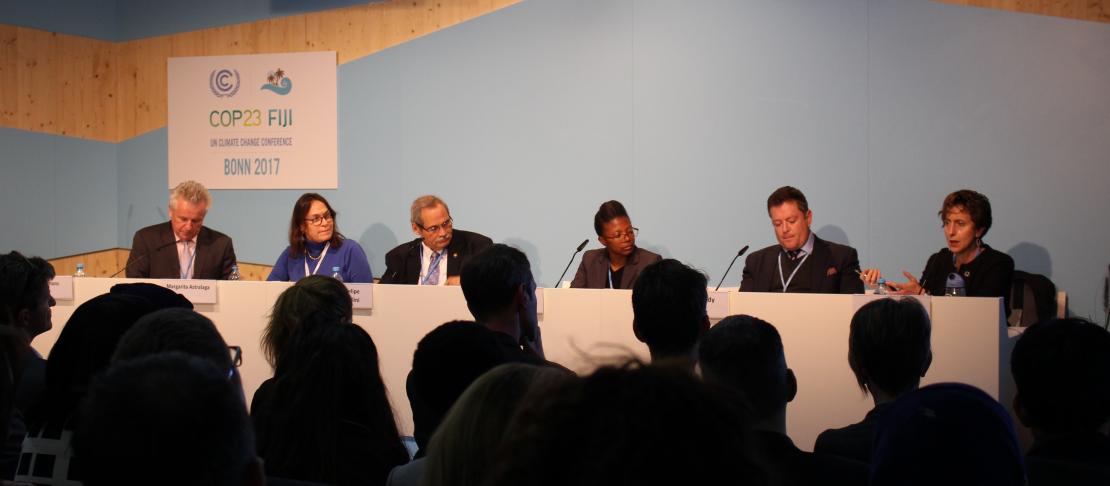Scaling up private sector climate actions in agriculture

Private sector-led climate actions are key to helping countries adapt to and mitigate the impacts of climate change in agriculture.
Under the Paris Agreement, countries overwhelmingly prirotise climate action in agriculture; 119 include agricultural mitigation, and 127 include agricultural adaptation in their Intended Nationally Determined Contributions (INDCs). Agriculture is also key to achieving Sustainable Development Goals (SDGs) set by countries.
Watch the video recording on the CCAFS youtube channel.
As part of the Agriculture Advantage event series on the sidelines of COP23, the event showcasing the business advantage focused on how to engage, through national government processes, intergovernmental agencies and stakeholder groups, with the private sector to scale up climate actions in agriculture.
The private sector has to see tangible benefit and appropriate mechanisms in order to invest in agriculture, said Luis Felipe Arauz Cavallini, the Minister of Agriculture and Livestock of Costa Roca in his opening remarks. He shared the Costa Rican experience on how data and results provided the evidence needed for investment in mitigation in coffee and livestock value chains without compromising productivity and increasing the system’s efficiency. He stressed the need to better communicate the results to make private sector interested in such projects.
But who exactly are the private sector and what are their needs? Margarita Astralaga from the International Fund for Agricultural Development (IFAD) said that defining the private sector is part of the issue; for IFAD, smallholder farmers are part of the private sector. She added:
One of the big issues is trust and speaking the same language and ensuring that everybody benefits from it. As the minister said, obviously the private sector is in there for a gain. But also the smallholders are there for a gain; they want to move out of poverty. So it means all of us have the same objective. So what I see from the discussions we have with the bigger private sector is, we want clear rules of the game. We want to make sure that the policy environment helps us.”
Fhumulani Mashau from the Southern African Confederation of Agricultural Unions (SACAU) also stressed the need for communication between stakeholders and beneficiaries; "farmers themselves also have the responsibility to proactively assert themselves to get involved in the design and implementation where they have an interest in climate action. Again, we'd also like to see the private sector to be obliged to consult with the farming community also in the design and implementation of climate action. We can't do that without talking to each other." This also involves awareness-raising, for example, there is a misconception by farmers on insurance, they usually see it as cost and not as a way of buffering themselves from risks.
Investors, private sector actors and markets respond best when operating environments and risks are well understood. For decades they have been searching for those signals with climate change and fortunately at COP21 in Paris and since the signals are becoming clearer. Matthew Reddy from the World Business Council for Sustainable Development (WBCSD) highlighted that Paris brought around the kind of thinking that agriculture is not just part of the problem but it offers solutions as well. He said that climate-smart agriculture is the best way that the objectives set out in the NDCs and SDGs can be met.
Diane Holdorf from Kellogg Company summed up why it is essential for businesses working with agriculture to invest in climate actions in agriculture:
We rely on resilient food systems in order to have a business. So working at the intersection of food security, hunger and sustainable agriculture, these aren’t just nice things for us to do, these are actually very critical to ensuring that we have a business going into the future. (…) We rely on farming communities who are both through practices contributors to greenhouse gas emissions but far more importantly, extremely challenged by climate change. So in order for them to be resilient, we need to play a role in trying to identify the types of tools, partnerships and market access information, that will make those farmers, big and small, more resilient.”
In his remarks, Bruce Campbell, Director of CCAFS, highlighted the need for transformation in the agricultural sector within the next decade in response to climate change, and that public-private-partnerships are a cornerstone for this transformation to occur. However efforts to scale up public-private-partnerships should be complemented with efforts to foster social capital, build strong farmer organizations to drive the process and more research on financial models and instruments to achieve scale.
Closing the session, Tony Simons, Director General of the World Agroforestry Centre (ICRAF), highlighted the need for a common vocabulary amongst different stakeholders while engaging with the private sector, and concluded by saying that "action and alignment trumps rhetoric and discord."
READ
- Read the summaries of the sessions on the CCAFS blog
- Event page: Agriculture Advantage event series
- Dinesh D, Campbell B, Bonilla-Findji O, Richards M (eds). 2017. 10 best bet innovations for adaptation in agriculture: A supplement to the UNFCCC NAP Technical Guidelines. CCAFS Working Paper no. 215. Wageningen, The Netherlands: CGIAR Research Program on Climate Change, Agriculture and Food Security (CCAFS).
WATCH
- Video: Agriculture Advantage: The case for climate action in agriculture
- Event recordings: CCAFS at COP23 playlist
- Presentations: CCAFS Slideshare
- Photos: CCAFS Flickr
Lili Szilagyi is the Communications consultant at the CCAFS Program Management Unit and CCAFS East Africa.
